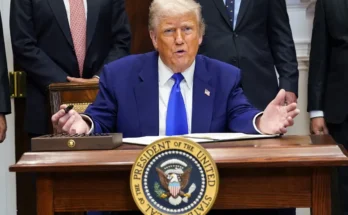In a fiery Truth Social post on October 27, 2025, President Donald Trump lashed out at pollsters and media outlets after new approval ratings painted a bleak picture of his standing with the American public. The data, released by The Economist, showed Trump’s net approval rating at -17%, a figure that has sparked renewed debate about the direction of his second term and the growing political divide across the country.
📉 The Numbers That Sparked the Firestorm
According to The Economist’s latest polling, only 39% of Americans approve of Trump’s performance, while 56% disapprove. The remaining 5% were undecided. This marks a 0.5-point drop from the previous week and comes amid a prolonged government shutdown that began on October 1, 2025.
The shutdown, triggered by a budget impasse in Congress, has left hundreds of thousands of federal workers without pay and disrupted services across the country. Critics argue that Trump’s hardline stance on immigration and federal spending has made compromise nearly impossible.
The poll also revealed that a majority of Americans believe the economy has worsened under Trump’s leadership—a sentiment echoed in a Fox News poll last month, which found that 52% of respondents felt financially worse off than they were a year ago.
💬 Trump’s Response: “Fake News, Fake Polls”
In a scathing post on Truth Social, Trump dismissed the poll as “fake” and accused mainstream media and pollsters of conspiring to undermine his presidency. “These are the same people who said I’d lose in 2016 and 2020,” he wrote. “They’re trying to rig public opinion again. But the American people are smarter than that.”
He went on to call The Economist a “globalist rag” and accused them of “pushing lies to help the radical left.” Trump also took aim at Fox News, a network he once championed, for what he described as “disloyalty” and “biased coverage.”
This isn’t the first time Trump has reacted angrily to polling data. Throughout his political career, he has frequently dismissed unfavorable numbers as inaccurate or manipulated, often citing his own internal polling or anecdotal evidence from rallies and social media engagement.
🏛️ The Shutdown’s Toll
The ongoing government shutdown has become a central issue in Trump’s approval slide. Now in its fourth week, the shutdown has affected everything from national parks to military paychecks. Negotiations between the White House and congressional leaders have stalled, with both sides blaming each other for the impasse.
Trump has insisted that the shutdown is necessary to force Congress to approve funding for his proposed immigration enforcement measures, including expanded border security and deportation operations. “We’re not backing down,” he said during a recent press briefing. “This is about protecting American sovereignty.”
But public sentiment appears to be shifting. A recent Pew Research Center survey found that 61% of Americans believe the shutdown is doing more harm than good, and 48% place the blame squarely on the president.
🧠 Political Analysts Weigh In
Political analysts say the approval ratings reflect a broader erosion of trust in Trump’s leadership style. “There’s a fatigue factor,” said Dr. Elena Ramirez, a political science professor at Georgetown University. “The constant confrontations, the shutdown, the rhetoric—it’s wearing people down.”
Others argue that Trump’s base remains solid, even if his overall numbers are slipping. “He still commands fierce loyalty among a significant portion of the electorate,” said conservative commentator Mark Reynolds. “But he’s losing independents and suburban voters who helped him win in 2024.”
🔍 A Closer Look at the Polling
The Economist’s poll was conducted between October 20–24, 2025, and surveyed 1,500 registered voters nationwide. The margin of error was ±2.9%. Key findings include:
- Approval among Republicans: 82%
- Approval among Independents: 31%
- Approval among Democrats: 7%
- Top concerns: Economy (34%), Government dysfunction (22%), Immigration (18%)
- Trust in Trump’s leadership: 41% say he is “strong but divisive,” 29% say “reckless,” and 18% say “effective and fair”
These numbers suggest that while Trump retains strong support within his party, he faces significant challenges in appealing to moderates and swing voters.
📺 Media Reaction and Public Discourse
Cable news networks and social media platforms lit up following Trump’s response. CNN’s Jake Tapper called the president’s remarks “a deflection tactic,” while Fox News anchor Laura Ingraham defended Trump, arguing that “polls are often weaponized by the left.”
On X (formerly Twitter), hashtags like #TrumpMeltdown and #FakePolls trended throughout the day. Some users mocked the president’s outburst, while others rallied behind him, echoing his claims of media bias.
🗳️ What This Means for 2026 and Beyond
With the 2026 midterms looming, Trump’s approval ratings could have serious implications for Republican candidates. A weakened president may struggle to campaign effectively for down-ballot races, especially in battleground states.
Democrats, meanwhile, are seizing the moment. Senate Minority Leader Chuck Schumer said in a statement, “The American people are tired of chaos. They want leadership, not tantrums.”
Some GOP strategists are reportedly concerned about the long-term impact of Trump’s combative style. “He energizes the base, but he alienates everyone else,” said one anonymous aide. “That’s not a winning formula in a general election.”
🧭 The Road Ahead
Despite the backlash, Trump remains defiant. In a follow-up post, he wrote: “We’ve been here before. They said we couldn’t win in 2016. They said we couldn’t come back in 2024. We proved them wrong then, and we’ll do it again.”
Whether that confidence will translate into political momentum remains to be seen. For now, the president faces a critical juncture: resolve the shutdown, rebuild public trust, and stabilize his administration—or risk further erosion of support.
As the nation watches, one thing is clear: the next few months will be pivotal for Donald Trump’s legacy—and for the country he leads.


